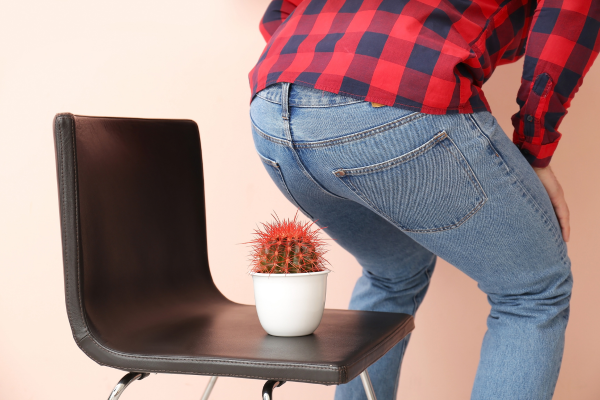Fissure
An anal fissure is a small crack on tear in the team, moist lining of the lower rectum. It can result in pain during and after bowel movement and there may be traces of blood in the stool.

𝗦𝘆𝗺𝗽𝘁𝗼𝗺𝘀 𝗼𝗳 𝗙𝗶𝘀𝘀𝘂𝗿𝗲
- Pain during bowel movements.
- A visible tear in the anus.
- A sharp, scaring or burned pain.
- Some bleeding, usually dark red on the toilet paper or a stool.
- Itching in anal area.
- Frequent anal abscesses.
- Fever, chills and fatigue.
- A small lump or skin tag on the skin near the anal fissure.
𝗖𝗮𝘂𝘀𝗲𝘀 𝗼𝗳 𝗙𝗶𝘀𝘀𝘂𝗿𝗲
- Constipation with excessive pressure.
- Chronic Diarrhoea.
- Passing hard stools.
- Pregnancy or childbirth.
- Poor hygiene.
- Trauma or injury to the anus or rectum.
- Due to digital insertion during examination and anal intercourse
𝗥𝗶𝘀𝗸 𝗙𝗮𝗰𝘁𝗼𝗿𝘀 𝗼𝗳 𝗳𝗶𝘀𝘀𝘂𝗿𝗲
- Aging.
- Obesity.
- Not eating healthy fruits and vegetables.
- Lack of physical activity.
- Any inflammatory condition of the anal area.
- Vaginal childbirth.
𝗣𝗿𝗲𝘃𝗲𝗻𝘁𝗶𝗼𝗻 𝗼𝗳 𝗳𝗶𝘀𝘀𝘂𝗿𝗲
- Drink plenty of fluids and get some exercise every day to help your digestive system moving.
- Avoiding constipation can help reduce your chances of an anal fissures.
- Take more fruits, vegetables and whole grains to your diet to get enough fibre.
- Sitz baths can help heal fissures and make you feel better.
- Don't delay using the bathroom.
- Regular exercise can reduce the risk of developing constipation.
- Avoid straining and sitting on the toilet for a long time.
𝗪𝗵𝗲𝗻 𝘁𝗼 𝘀𝗲𝗲 𝗮 𝗗𝗼𝗰𝘁𝗼𝗿
You should see your doctor if you notice blood in your stool or toilet paper or if your bowel movements are so painful that you are avoiding going to the bathroom.
𝗪𝗵𝗮𝘁 𝘄𝗲 𝗱𝗼?
𝗟𝗮𝘁𝗲𝗿𝗮𝗹 𝗜𝗻𝘁𝗲𝗿𝗻𝗮𝗹 𝗦𝗽𝗵𝗶𝗻𝗰𝘁𝗲𝗿𝗼𝘁𝗼𝗺𝘆:- The doctor cuts a small part of the anal sphincter muscle, which is releasing the tension and reduces the spasm and pain. This is done in many anal fissure cases because it leads to less pain and spasm.
𝗟𝗮𝘀𝗲𝗿 𝗦𝗽𝗵𝗶𝗻𝗰𝘁𝗲𝗿𝗼𝘁𝗼𝗺𝘆:- Laser sphincterotomy is a procedure used to relax muscle (sphincter) spasm, which reduces pressure in the anal canal and heals chronic fissures. It is a safe, minimally invasive, painless surgical procedure.
